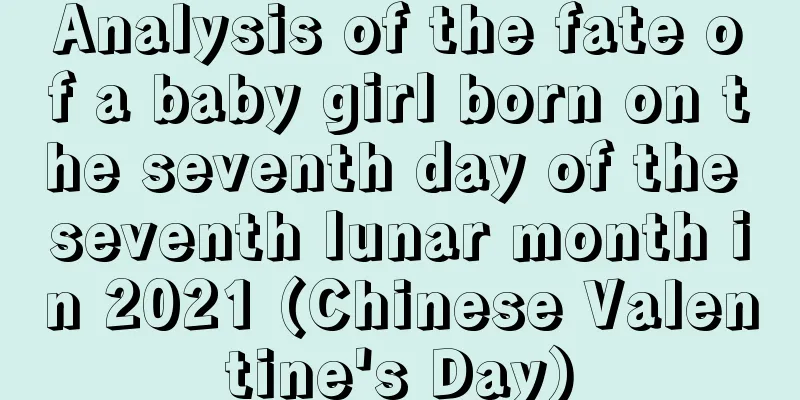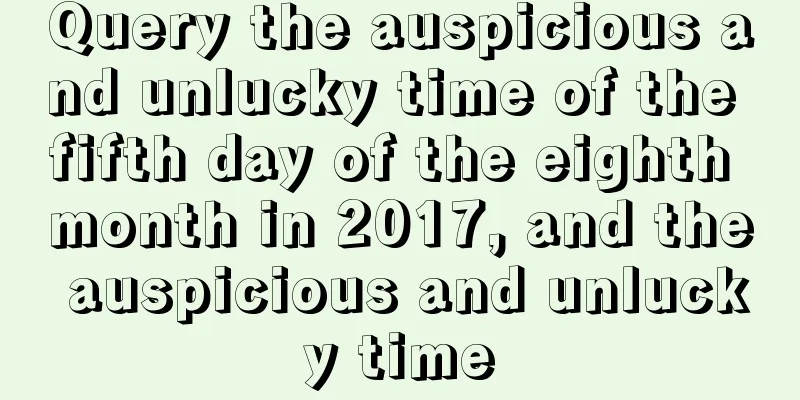What traditional foods are eaten on the Qixi Festival? What are the folk activities on the Qixi Festival?

As the name suggests, the Chinese Valentine's Day is on the seventh day of the seventh month every year. So what traditional food do we eat on this festival? What are the folk activities of the festival? The seventh month of the lunar calendar is also called "New Autumn", representing the beginning of autumn and heralding harvest and renewal. If you want to know whether the seventh lunar month of 2019 is a good day, just go to Shui Mo Xiansheng website for consultation!What traditional food is eaten on Qixi Festival?The Chinese Valentine's Day is also known as the "Qiqiao Festival". The food customs of the Chinese Valentine's Day vary from place to place, and it is generally called "eating clever food."1. Qiaoguo: On this day, people in various parts of Zhejiang make various small objects with flour, fry them in oil and call them "Qiaoguo". In the evening, Qiaoguo, lotus pods, white lotus roots, red water chestnuts, etc. are displayed in the courtyard. Among the festive foods eaten during the Qixi Festival, the most famous is the Qiaoguo. Qiaoguo, also known as "Qiqiao Fruit", comes in many styles. The main ingredients are oil, flour, sugar and honey. In Dongjing Menghualu, it is called "Xiaoyaner" and "Fruit Food Patterns", and the patterns include Naxiang and Fangsheng. 2. In addition to eating Qiaoguo, in some places, Qiaoya noodles are eaten on the seventh day of July. The bean sprouts used to make Qiao Ya noodles must be grown seven days in advance. Choose a small bowl of green beans that are not worm-eaten, wash them, spread them flat on a plate, cover them with wet gauze to block out the sunlight, place them on the head of the kang, and spray them with water several times a day to keep them moist. After seven days, when the bean sprouts grow to two or three centimeters long, you can make hand-rolled noodles. Boil them in a pan and rinse them with cold water. Then heat up some oil in a pan, add the diced meat and stir-fry, sauté the scallions and ginger, add soy sauce and vinegar, add the mung bean sprouts and stir-fry, add water and bring to a boil, then add salt and MSG to make bean sprout soup. Put the noodles in a bowl, pour the bean sprout soup over them and they are ready to eat. 3. Cloud noodles: People in Jiaodong eat Qiaoguozi on the Chinese Valentine's Day, while people in Linyi eat cloud noodles on the Chinese Valentine's Day. Eat cloud noodles, which are made with dew. Eating them can bring you good luck. 4. Jiangmi noodles: Old Nanjing people have a unique custom during the Chinese Valentine’s Day: eating Jiangmi noodles. Jiangmi noodles are a snack of the Han nationality. They are made by adding glutinous rice flour to bean powder and then steaming it in a stew pot. Then, they are pounded in a stone mortar with a stick, formed into a round shape, dried and fried in oil, and finally dipped in bean paste such as plum blossom, pine flower, and sesame. 5. There are also many folk pastry shops that like to make some crispy candies in the image of weaving women, commonly known as "Qiao Ren" and "Qiao Su". When they are sold, they are also called "sending Qiao Ren". This custom has been passed down to this day in some areas. 6. Fruits and vegetables are of course indispensable on this special festival of Chinese Valentine’s Day! There are many variations of fruits and vegetables eaten during the Chinese Valentine's Day. Some people like to carve fruits and vegetables into exotic flowers and birds, or emboss patterns on the surface of the melon skin to make them into "flower melons". 7. Worshiping the Weaver Girl on the Qixi Festival is a big event for young girls and young women. The offerings include tea, wine, fresh fruits, etc., and the five seeds (longan, red dates, hazelnuts, peanuts, melon seeds) are indispensable. After burning incense and praying silently, these offerings become their midnight snacks. What are the folk activities of the Qixi Festival?1. Women washing their hair: It is a very special folk custom for women to wash their hair on the Chinese Valentine's Day. It is recorded in the local chronicles of Hunan, Jiangsu and Zhejiang. For example, the "You County Chronicles" of Xiangtan area in Hunan Province states: "On July 7th, women pick cypress leaves and peach branches, boil them into soup and use them to wash their hair." This custom may be related to the holy water of the Qixi Festival.2. Planting seeds to pray for children The custom of planting seeds to pray for children is popular in both the north and south of China. A few days before the Chinese Valentine's Day, a layer of soil is spread on a small wooden board, and seeds are sown to grow green seedlings. Some small thatched houses are then placed on top to make it look like a small village of farmers. In the south, it is called Pao Qiao, and bean sprouts are called Qiao Ya. Some people even use Qiao Ya to replace needles and throw them on the water to pray for cleverness. Various images are also sculpted out of wax, such as the shapes of animals in the story of the Cowherd and the Weaver Girl, and placed on the water to float, which is called water floating. Or people would buy wax baby dolls and let them float on the water and soil, believing that it would be a good omen for having a child, which was called "transformation". 3. Worshiping Qiniangma The Qixi Festival in southern Fujian and Taiwan is Qiniangma’s birthday. Qiniangma is highly worshipped by the people. She is regarded as an idol who protects children's safety and health. In ancient times, people placed all their hopes on their children, so the Qixi Festival evolved into a day of prayer for the Seven Niangma Goddess. Qiniangma became the patron saint of underage children. When the baby is one year old, the mother or grandmother will hold the child, bring rich offerings, and go to the temple to worship, praying to Qiniangma to protect the child and grow up safely. 4. Dyeing nails is a folk custom during the Chinese Valentine's Day. It is popular in southwest China, especially in Sichuan, Guizhou and other places. Dyeing nails with flowers and plants is also a form of entertainment for most girls and children during the festival. Many young girls dye their nails with flowers and leaves during festivals. It not only makes them look younger and more beautiful, but also helps unmarried girls find their ideal husband as soon as possible. It is also related to local beliefs. 5. Qijie was born in Lingnan Guangdong. There is a traditional folk custom of worshiping the gods on the Qixi Festival. Married women are generally not allowed to participate in this activity, but married brides must hold a ceremony to bid farewell to the gods during the Qixi Festival. When offering sacrifices to the gods on the sixth night of the first lunar month, it means parting with the Girl's Day. As the saying goes, "A good fate is not as good as good luck." A person's destiny is already determined, and the only thing that can be controlled is his or her "luck." Unexpected changes in the world may happen at any time, so use Mr. Shui Mo's [Premium Calculation] function to learn more about your fortune in 2019! |
<<: 2019 Lunar June 26th Lunar Calendar Auspicious Time Query, Hourly Auspicious and Unlucky Query
>>: When is Chinese Valentine's Day this year? When did the name Qixi Festival appear?
Recommend
Is it a good time to open a shop or company on the ninth day of the fourth lunar month in 2020? What is the feng shui?
The opening of a business requires consideration ...
Is the third day of the sixth lunar month in 2021 an auspicious day? Is it good to pray?
There are a lot of people praying every day, but n...
What traditional foods should we eat during Xiaoman? What should we pay attention to when eating bitter vegetables during Xiaoman?
Introduction: The Grain Full solar term is one of ...
How is the seventh day of the ninth lunar month in 2022? Is it suitable for breaking ground?
How is the seventh day of the ninth lunar month in...
What day is suitable for the second day of September in the lunar calendar in 2020?
What day is suitable for the second day of Septem...
What time is Minor Cold in 2022? Is Xiaohan an auspicious day?
The Minor Cold solar term is one of the coldest so...
Is the Beginning of Spring the beginning of spring? Is it good or bad to celebrate the beginning of spring during the Chinese New Year?
The Beginning of Spring is both a solar term and a...
What blessings should you send on WeChat on Dragon Head Raising Day in February 2022?
The second day of the second month of the lunar ca...
Is it good for a girl born on Christmas Day 2018?
It is said that girls have two chances to choose t...
What are the precautions during the Grain Rain solar term?
Introduction: Each solar term has its own characte...
Is the 23rd day of the 12th lunar month in 2018 an auspicious day for ancestor worship?
Introduction: In our country’s traditional customs...
What is the lunar calendar for February 19th, 2019? Is it a good day?
Spring is a great time full of vitality, with eve...
Is the second day of the fifth lunar month in 2018 a good date in the lunar calendar? Is it suitable for breaking ground?
Introduction: Breaking ground for renovation has b...
What is the date of November 16th of the lunar calendar in 2019?
What is the date of November 16th of the lunar ca...
Is it a good idea to sign the contract on October 10, 2020? What will the hexagram show on November 24?
Introduction: According to traditional customs, si...









